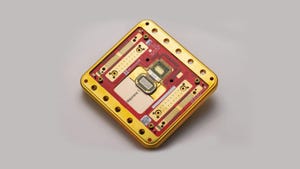What AMD’s $4.9B Acquisition of ZT Systems Means for the Data CenterWhat AMD’s $4.9B Acquisition of ZT Systems Means for the Data Center
In one of the biggest IT deals of the year, silicon vendor AMD announced its intention to acquire ZT Systems for $4.9 billion. What do the analysts think?

Silicon vendor AMD announced a strategic move to significantly expand its data center AI systems capabilities with the acquisition of ZT Systems, a leading provider of AI infrastructure for hyperscale computing companies.
The deal, valued at a massive $4.9 billion, marks a major step in AMD’s long-term AI strategy and is aimed at positioning the company to compete more effectively in the rapidly growing data center AI market.
The acquisition, announced on Monday (August 19), will combine AMD’s high-performance Instinct AI accelerators, EPYC CPUs, and networking products with ZT Systems' experience in designing and deploying data center AI compute and storage infrastructure at scale.
Following the transaction’s close, ZT Systems will be integrated into AMD’s Data Center Solutions Business Group.
“ZT adds world-class systems design and rack-scale solutions expertise that will significantly strengthen our data center AI systems and customer enablement capabilities,” Dr Lisa Su, AMD Chair and CEO, said in a statement this week.
With all eyes on the rapidly evolving semiconductor market, we spoke with analysts to hear what the acquisition means for the data centers that underpin the AI boom.
‘More Competition than Ever’
Industry experts suggest that the acquisition will not only position AMD as a stronger competitor to Nvidia but also help it further distance itself from rival Intel, which has struggled financially.
“The incumbent data center CPU vendors, Intel and AMD, are facing more competition than ever as large cloud service providers develop and deploy their own Arm-based CPUs,” Vladimir Galabov, research director at Omdia’s cloud and data center practice, told Data Center Knowledge.
Galabov noted that computing is increasingly performed outside the CPU. Servers configured with many co-processors are used at scale for efficient security, media, and AI applications – and this is just the beginning. He added that in the face of these challenges, Intel is becoming a foundry looking to manufacture processors that others design.
“With the acquisition of ZT Systems, AMD is sending us a clear signal that they are not giving up but rather developing a vertically integrated solution like Nvidia,” Galabov said

Santa Clara-based AMD will acquire ZT Systems $4.9 billion
According to Galabov, it is often overlooked that Nvidia’s advantage does not come simply from its GPUs, Nvidia also developed an industry-leading networking and software stack.
“With ZT Systems on board, AMD will be able to develop a rack-scale design or even a cluster-scale design in-house," Galabov said. “Do not be surprised to see them buy a software company next.”
Paul Schell, industry analyst at global technology intelligence firm ABI Research also sees the AMD acquisition as a play against Nvidia. In his view, AI chip vendors are playing catch-up to market leader Nvidia, whose dominance stems from individual chip performance to overall systems-level designs consisting of interconnected servers, racks, and clusters.
“The next generation of AI models at scale will require optimized solutions across individual silicon all the way up to the entire domain-specific data center, and ZT’s legacy in systems design includes large deployments for hyperscalers,” Schell told Data Center Knowledge.
“Along with the rest of AMD’s AI data center portfolio, this purchase provides a more holistic offering, which has the potential to boost their data center scale offering.”
Challenges with AMD’s Acquisition of ZT Systems
For Ben Bajarin, CEO and principal analyst at Creative Strategies, there are some concerns about AMD’s acquisition of ZT Systems.
The main issue is whether the deal will enable AMD to be a larger player in data center buildouts overall, as ZT Systems today also works with Intel and others.
“AMD is saying they will divest of the broader business not related to AMD, so we don’t know how that will work out, whether they sell it off or something else,” Bajarin told Data Center Knowledge. “But if ZT systems under AMD continues to build systems for Intel, Nvidia, etc., it could raise antitrust issues.”
In his view, the acquisition is essentially about AMD’s own custom vertical design around its own systems. He added that the goal is to help AMD grow its own business in the data center, and broadly the expectation is that AMD is going to grow that business regardless.
“This just helps them be involved even at the rack design [and] cooling… level, which the goal is to benefit only AMD and not others,” he said.

AMD Instinct MI300X accelerator for AI workloads
Another Milestone in AMD’s Data Center Strategy
Daniel Newman, CEO of The Futurum Group, sees the ZT Systems acquisition as another significant step in AMD’s overall growth strategy.
Newman told Data Center Knowledge that over the past year, AMD has been aggressively investing in software and consulting services companies to enable it to grow more rapidly into what it has described as a $400 billion AI Chips (GPU, XPU) market by the end of 2027.
Read of the latest data center hardware news
“AMD is the unchallenged number two in data center AI GPUs and has already seen its $4.5 billion annual forecast Instinct portfolio swell,” Newman said.
“However, many investors and likely AMD insiders all see the opportunity as substantially larger given the strong capex demand for AI chips and the perceived interest in a meaningful competitor to take on Nvidia’s strong moat and pricing power.”
Read more about:
Chip WatchAbout the Author
You May Also Like









